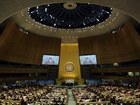Russia has absolutely no intention of ordering its armed forces to cross over the Ukrainian border and the divisions between Moscow and the West on the crisis are narrowing, Russian Foreign Minister Sergei Lavrov said Saturday.
"We have absolutely no intention and no interests in crossing the Ukrainian border," Lavrov told Russian state television in an interview, appearing to firmly rule out an invasion of mainland Ukraine after Moscow's seizure of Crimea.
 Full Story
Full Story
Russian President Vladimir Putin called his American counterpart Barack Obama Friday to discuss a U.S. proposal for a diplomatic end to the Ukraine crisis while insisting to the United Nations that Moscow had "no intention" of further military action.
The White House said Putin phoned Obama following a bid presented to Russian Foreign Minister Sergei Lavrov by U.S. Secretary of State John Kerry earlier this week.
 Full Story
Full Story
Wary of their powerful neighbor Russia, the Baltic states of Lithuania and Latvia plan to double defense spending while Estonia will maintain its strong level after watching Moscow take over Crimea.
The three countries of 6.3 million people will mark on Saturday a decade since joining the NATO military alliance, a move seen as a bulwark against unwanted Russian overtures.
 Full Story
Full Story
U.S. President Barack Obama in an interview aired Friday said Russia must "move back" its troops from the Ukraine border and start negotiating.
Obama told CBS News that Russian President Vladimir Putin's decision to assemble forces on the border may "simply be an effort to intimidate Ukraine, or it may be that they've got additional plans."
 Full Story
Full Story
Ukraine's race to succeed ousted Russian-backed president Viktor Yanukovych heated up Friday after his arch-rival Yulia Tymoshenko joined a crowded field of contenders ready to tighten Kiev's embrace of the West.
The charismatic but hugely divisive Tymoshenko's decision to contest the May 25 poll encapsulates the spectacular scale of change that has swept over the culturally splintered nation since it was first hit by waves of deadly pro-Europe protests four months ago.
 Full Story
Full Story
The U.N. General Assembly on Thursday adopted a Western-backed resolution declaring Crimea's breakaway referendum illegitimate and refusing to recognize Russia's annexation of the peninsula.
The non-binding measure passed with a comfortable majority in the 193-member body, with 100 votes in favor and 11 votes against. But 58 abstained and more than 20 did not vote.
 Full Story
Full Story
Barack Obama will meet Pope Francis for the first time Thursday for talks on a shared agenda to fight inequality which the U.S. President hopes will help boost support at home.
The talks between the first Latin-American pope and first African-American U.S. president will focus on tackling the gap between the rich and the poor, but are likely to spill over into thornier issues such as abortion, homosexuals and contraception.
 Full Story
Full Story
Ukraine's maritime forces have been severely diminished by the Russian intervention in Crimea after they lost 12 of their 17 warships to Moscow, defense analysts Jane's said Wednesday.
Around 12,000 of the Ukrainian navy's 15,450 personnel were based in Crimea when Russia first intervened on February 27, and since then have lost the bulk of their assets, Jane's said in a commentary.
 Full Story
Full Story
Nervous over Russia's recent assertive behavior in Ukraine, Georgia on Wednesday sought a fresh pledge from Moscow that it would not use force to resolve their simmering territorial conflict.
"Georgia remains committed to its non-use of force pledge unilaterally taken in 2010," said chief negotiator David Zalkaliani after the latest round of internationally-brokered peace talks in Geneva.
 Full Story
Full Story
Russian government officials have swapped their iPads for Samsung tablets to ensure tighter security, the telecoms minister told news agencies on Wednesday.
Journalists spotted that ministers at a cabinet meeting were no longer using Apple tablets, and minister Nikolai Nikiforov confirmed the changeover "took place not so long ago."
 Full Story
Full Story



